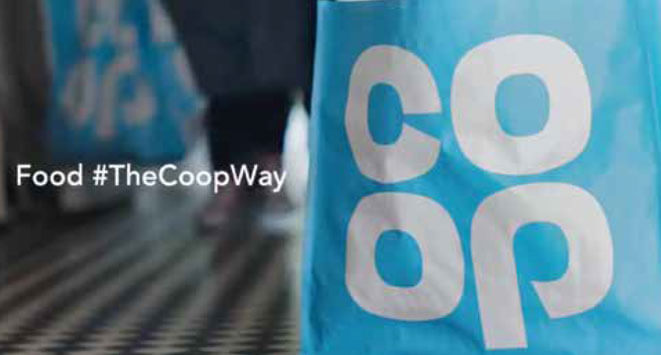A little movement
Every now and then, a brand relaunch is undertaken with such faithfulness to the tenets of best-practice marketing that you just will it to succeed – all the while wondering if some piece of bad luck or overreaching might yet be its undoing. The recent overhaul of the Co-op, which got going in earnest last month, ticks the boxes.
The first thing it did was nothing; it didn’t rush anything on the brand side until some nasty internal messes had been cleaned up. This was a good call. With the disastrous losses at The Co-operative Bank behind it, and its stake in that business reduced to 20%, the group entered 2016 in reasonable shape to plan a resurgence based on its profitable grocery and Funeralcare arms.
In its quest for an inspiring new brand positioning, the team adopted the principle of thinking forward by looking back – reinterpreting foundational roots for contemporary consumers. Every brand, no matter how seemingly trite, has some kind of creation story on which it is possible to draw, but few can boast a richness quite like the Co-op’s, founded in 1844 by a group of Rochdale flannel weavers bent on fostering self-help for member communities and ousting rapacious middlemen.
And do you know what? That turns out to be a thoroughly modern concept: those early cooperative societies, along with the 19th-century building-society movement, basically invented the sharing economy 160 years before Uber, Crowdcube and Airbnb came along and invented it all over again.
So the brand announced in May that it would “put membership and community back at the heart of the business”, underlining that commitment with membership rewards of 5% on own-label purchases and a further 1% contribution to a range of community causes.
Then what? Symbolise the change. Textbook stuff. The business has done this in two ways. First, with a change of name, sensibly recognising that no-one ever said “I’m just popping down to the Co-operative for some tea bags”, and reverting to the more colloquial “Co-op”.
 And, more controversially, with a return to the “cloverleaf” logo, a classic piece of typographical economy with a touch of 60s architectural brutalism about it. The move has done what any logo change should do and split the jury, thus creating debate. For some, it evokes memories of the shoddy shops of the 70s and 80s that no-one visited unless it was the only game in town, while those who like their design chaste vociferously approve. Either way, it gives the own-label packs some much-needed oomph.
And, more controversially, with a return to the “cloverleaf” logo, a classic piece of typographical economy with a touch of 60s architectural brutalism about it. The move has done what any logo change should do and split the jury, thus creating debate. For some, it evokes memories of the shoddy shops of the 70s and 80s that no-one visited unless it was the only game in town, while those who like their design chaste vociferously approve. Either way, it gives the own-label packs some much-needed oomph.
Then – more nothing, or so it seemed, with a gap between the original announcement in May and the practical launch in September. But the group was getting the people on the inside fired up for the relaunch first, with 5,000 “colleague events” on the theme of “Back to being Co-op”.
Finally, having spent so much time in introspective mode, the Co-op turned to an outsider to bring fresh thinking to the drive for membership growth, with the appointment of Rufus Olins, a former publisher on Campaign with no experience in the co-operative movement or its trading categories, as chief membership officer.
So far, it’s like a “how to” for a brand relaunch: don’t rush, go back to your roots, make heritage contemporary, think big, emphasise it with a sacrificial gesture, symbolise change, get your own people onside first, stay open to outside ideas. What could possibly go wrong?
Well, that 20% ownership of the Co-operative Bank is worryingly ambiguous – small enough not to be in control, but big enough to be damned by association if the bank screws up again.
More insidious, though, might be the group’s own belief in its renewed societal force, with its chair, Allan Leighton, declaring that: “We are on the verge of creating a co-operative economy.” How realistic is that? And how realistic is its ambition to sign up one million new members, or to double member purchases to 50% of all grocery sales? If profit forecasts are predicated on that upsurge, there is plenty of room for disappointment.
It’s that word “member” that’s at the root of self-deception – not just for the Co-op, but for other brands out there craving deeper “engagement” too. A discount card becomes a loyalty card becomes a membership card. We see it a lot these days – the masking of what is merely a transactional come-on as something grander.
If the Co-op’s new image appeals, and if the business stays competitive in quality and pricing, a little forward movement in market share would be a just reward. But to expect a bigger social movement, even in these times of ballot-box protest at establishment elites and global capitalism, is dewy-eyed. It’s a shop, in the end, with a funeral business tacked on. No-one ever said “I’m just popping down the Co-op to change the world”, either.
1799
Robert Owen, “the father of co-operation”, introduces ideas for worker reform in his New Lanark Twist Company that would influence future co-operative pioneers.
1844
The Rochdale Equitable Pioneers Co-operative Society is the first to succeed in putting principles into practice and its formula – which includes the refusal of credit – becomes the blueprint for the movement.
1876
The Co-operative Bank is founded to husband the considerable resources of the UK’s 400-plus co-operative societies.
1940s
The “cradle-to-grave” Co-op is at its zenith, accounting for 25% of all grocery sales, insuring one in ten households and becoming Britain’s biggest funeral director.
1968
The “cloverleaf” logo is unveiled and Britain sings along to the “caring, sharing Co-op” TV jingle.
2013
The Co-operative Bank is hit by a £1.5bn hole in its finances and chairman Paul Flowers is exposed as a user of illegal drugs.
2016
Co-operative Group chief executive Richard Pennycook announces that he will take a 60% salary cut, paving the way for a “back-to-roots” brand relaunch.
